#ignore the evangelion quote
Text
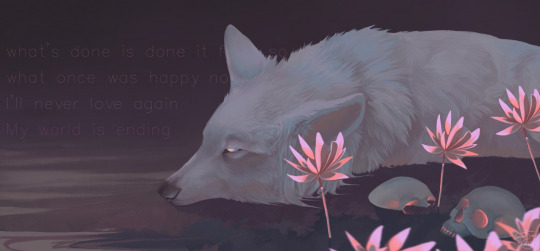
"Come, sweet death"
24 notes
·
View notes
Text
essay on NGE (and RGU) under the cut
if I really wanted to oversimplify, I could say that NGE and RGU are essentially the same story. both are about whether it's worth it to go on living, to come to life, or if it's better to die, to stay half-living. they use their respective characters, genres, and symbolic systems in order to investigate this issue.
to approach the shows that way would of course be flattening, since they explore the themes they share in different ways. I find myself in a loop when I try to compare them: first, I'll think of a way they're similar, but the second I write down the commonality, I think of an exception. when I try to write about how they're different, I end up realizing they're the same.
rather than try to parse all of that out, I'd like to talk about what NGE and RGU have given me, respectively. I first watched the shows back to back when I was 16. RGU has occupied a lot of my headspace since I rewatched it in 2020, while NGE was more of a teenage interest. however, NGE is still important to me, because it does things for me that RGU doesn't (just as RGU does things for me that NGE doesn't). the two works compliment each other well, in my opinion.
in the 90s, Ikuhara and Anno were fairly close, and did a string of interviews together to promote Evangelion. the below quote is from an interview with Newtype which was conducted during NGE's production:
Kunihiko Ikuhara: Hmm, what I'm hoping for from Evangelion is that it will be a drama that shows us an embodiment, a concrete way to be happy.
--Our Happiness: The Happiness Depicted by "Evangelion"
did Ikuhara get what he wanted out of Evangelion? "a concrete way to be happy"? I don't know. perhaps Ikuhara went on to make RGU because he didn't see what he wanted in Evangelion. RGU--all Ikuhara works--have some kind of relief in them. a moment of revelation, change, reconcilliation, transcendence. Evangelion points in similar directions, but it never truly resolves; it never relents.
but Ikuhara goes on to say:
Kunihiko Ikuhara: There are many young people who think that they will be happy if their current situation changes. They think that because the situation is bad, they can't be happy or do well. That's not true. What makes us happy is our ability to materialize - to give shape to our happiness.
this was something that the final episode of NGE communicated to me quite powerfully when I was a kid. first, the animation style changes, and the show depicts how material reality restrains freedom, but how total freedom would mean total disconnection, the inability to interact with the world. later, Shinji has visions of a sitcom version of Eva, where the story plays out like a bad anime. somehow, this is what leads into the revelation he has at the last moment of the episode. I couldn't have explained it at the time, but this ending worked very well for me. I think I've finally put my finger on why.
the voices of all the people Shinji knows give him a lecture, dispensing advice which could feel insulting or could be hard to take. I was struck by him being told, "you're the only one who can understand yourself, so take care of yourself." like many young people, I had the fantasy that I would meet someone who truly understood me, and that it would somehow free me from all bonds. I wanted to be helped and saved, and here was this show, telling me to my face, "it's actually your responsibility to do that for yourself." I didn't want to believe it, especially not that I would never be understood the way I wanted to be... but I couldn't ignore it either.
there's also a part where Shinji is told that "on rainy days, you feel glum, but on sunny days, you feel happy. but that's only a matter of your perception." this sounds like something a bad therapist would tell you: that you can just willpower your way out of suffering by changing how you look at a situation. but I think it's not quite that.
this goes back to the sitcom sequence. Shinji witnessed a different version of himself, one with normal problems, and he realized that the world is actually indifferent to him, the way that the world is indifferent to whether there's rain or sunshine. the whole show, he's been afraid of indifference, and he's been afraid that he's looked down on by others. he's judged himself, felt like absolute scum. but at the same time that he's forced to realize that he will never receive perfect acceptance and understanding from someone else, he also realizes that indifference is a great gift, because it means whether he is the "rainy" or "sunny" version of Shinji, he is still allowed to exist. he is a part of his world, a mirror of it, and so there's no reason to hate himself for his failings. it's a realization that he has a place in the world, and he's congratulated for it.
but Evangelion didn't stop there. I rejected End of Eva the first time I watched it, in part because I really disliked the live action shots (which I thought were pretentious) but also because the story was so depressing, especially after the relatively uplifting ending of the show.
the film does have moments of transcendence, but they're all of an existential, apocalyptic, and ecstatic-through-suffering kind. Yui tells Shinji, "as long as the sun, moon, and earth exist, everything will be alright," taking the idea that circumstances don't dictate happiness to the extreme. she becomes a monument to humanity, sacrificing herself and allowing the apocalypse in order to do so. is it beautiful, or horrible? are humans so afraid to be annihilated that we annihilate ourselves?
more unsettling, our main characters get what I'd like to call "anti-resolutions." Ritsuko fails to even get revenge on Gendo, betrayed by her mother til the end. Misato may be right that she's learned with every mistake she's made, but she dies the same person she always was, crying out to Kaji for reassurance. our young protagonists all have moments of self-actualization, but they are immediately cancelled, rendered void. Asuka regains her desire to live, only to be killed. Rei makes a choice--a crucial choice--but she hands the final decision over to Shinji, losing her individuality in the process (when she's always longed to be a discrete individual). then Shinji makes what seems to be the right choice, but is not rewarded for it.
I've always found it fascinating that people can watch NGE and come to the conclusion that Third Impact was a good thing and humans should have stayed tang. it's certainly the more peaceful option. everything would just be... over. no more strife caused by the fact that we cannot understand each other, that we cannot cross the divide of being and experience each others' experience.
in a triumphant moment, Shinji decides against living as fluid. he knows his feelings were real, and could only ever be real, in that other world, where people are separate, because not having any boundaries is the same as not existing.
the logic of fiction tells us that, since Shinji "did the right thing," there should be a good outcome as a result. but no, there isn't. when he's back in his body, the world is worse than it's ever been, and only Asuka is by his side. he has the ability to hurt people again. yes he can be caressed, but he can also be scorned, hated--and people can have good reasons to scorn and hate him.
this was an entirely new gift that End of Eva gave me, and it's stuck with me ever since. it was an acknowledgment of suffering that promised no respite or happy ending. if we are not to kill ourselves, we have to face the fact that life may offer no rewards. we may never get what we want, and there will certainly be pain along the way. relationships can fall apart, and we can let ourselves down.
although Ikuhara has said that he created RGU in the hope that it would help kids see an option other than suicide, I would say that NGE has done more for helping me live than RGU, for the reasons I outlined above. it was my sense as a teen that there was no way out of the pit. maybe it's true that people can't understand each other, but through the power of art, I felt understood by NGE. that went a long way.
RGU was something very different; it had a different gift to give, and I had to mature in order to accept it. I don't think RGU offered a "concrete way to be happy" either, but it did make concrete the process of liberation. RGU is about freedom, freedom from just about everything: illusions, dependence, time, the self, you name it. by dramatizing the process by which a community is turned inside out and changed irrevocably, the show proves that liberation is possible. Anthy comes to stand in for the repressed part of all women, and so her revolution is the revolution of womanhood. most affectingly, the show involves the audience in the story using a variety of means. by forcing the audience to see themselves as part of the narrative, getting them to examine their own perceptions and identify with the characters, RGU operates as a direct challenge to the viewer, asking them to revolutionize their own world as soon as possible.
to wrap this up, I see NGE and RGU as stories which I needed at different times in my life. I imagine I'll return to them for years to come, but it makes sense to me that NGE came first. I don't think I could have tried for freedom before I internalized the ideas that NGE offered me. in the long run, RGU has had more impact on my thinking and personality, but NGE paved the way for it, kindly playing the role of John the Baptist for me. it is the gospel for the new century after all.
15 notes
·
View notes
Text
Occasionally when looking through Pacific Rim materials... I find an instance where one of its creators is just flat-out wrong in every conceivable way. Take this quote from Travis Beacham in Pacific Rim: Man, Machines, & Monsters, for example:
"In traditional Western cinema," says writer Travis Beacham, "technology is treated as kind of a Faustian deal that's going to come back to bite you in the ass. But if you look at the Asian tradition of storytelling, technology is a tool and a solution to problems. I wanted this movie to exemplify that attitude."
I can only hope Beacham has learned better since saying this (it has been well over a decade, after all), but like, holy shit Past Travis.
"The Asian tradition of storytelling" is just... not a thing? There are many, many, many traditions of storytelling in Asia, because it's not a monolith.
And while I can't comment much on various other Asian storytelling conventions, I can very much say that critical attitudes toward technology aren't exactly rare in Japanese media. The very first Godzilla movie is famously commentary on nuclear destruction and the development of devastating weapons. Princess Mononoke was a story about the harm wrought upon the environment by technology. Neon Genesis Evangelion put a horrifying spin on giant mechs. The antagonists of Final Fantasy 6 are an empire that exploited a rare resource to fuel its war technology.
You know who really did have an unshakable conviction that technology was going to Save Us All, though? A lot of white American atheist guys in the early 21st century.
Beacham's ignorance and naivete at this point in time is one reason why I am particularly interested in the exploration of jaegers' dark potential. Beacham effectively decrees here that his thesis for Pacific Rim is that technology can be purely good, and appeals to this supposed "Asian tradition storytelling" (whatever that even means) to justify it. But Beacham is just straight-up wrong. And I, well. I am an argumentative shit. So.
11 notes
·
View notes
Note
No offense but at the end of the day, every non-joke submission is going to be "because I don't like it" regardless of the reason they SAY.
Do you want this poll to be about anime with poor sound/writing/visual/acting quality?
Do you want this poll to be about anime with 'unethical' elements (i.e. people think it endorses harmful acts or features 'gross' relationships)?
Do you want this poll to be about 'annoying' anime or their fandoms?
People can say why they don't like it but it's still just as valid as people who don't say why because they all just don't like it.
Out of that list you posted, I'd vote for Sword Art Online, The Seven Deadly Sins and Evangelion, purely because I tried all of them and they all annoyed me. I could get into WHY they annoyed me but it's still just my personal distaste for them.
If I were you, and I genuinely mean this as advice and not criticism, the only way I see this poll bracket working is if you accept any and all reasoning, and choose based on the numbers.
As for propaganda, I'd just do word for word quotes in reblogs or just answer the asks and ignore any submissions that seem threatening or cruel, and maybe make a tag for it in case someone wanted to block it.
Thanks for your advices
2 notes
·
View notes
Text
Neon Genesis Evangelion Ep 4 "Hedgehog's Dilemma" -> Review/analysis ^_^

this episode is also on my list of favorites from the series! the epsiode opens with misato waking up, and then going to shinji's room (who now has a more permanent sign on his door reading 'shinji's room'). she tells him to get up and get ready for school, and it's revealed that he hasn't been in class for five days. when she receives no answer, misato opens to door to find shinji gone, only leaving a note and his nerv card. misato seems disappointed, but she understands how terrifying pilot the eva must be.

a bit later, toji and kensuke visit shinji. it's obvious that toji feels very guilty for hitting shinji and getting in the way of his fight with shamshel. kensuke doesn't seem to feel this remorse. but they both are worried about shinji, and ask misato where he's been. i really like the relationship between toji, kensuke, and shinji, especially as it develops into real friendship. it's really one of the only healthy (enough) relationships in the series. misato is surprised by their visit, and tells them that shinji is busy training at nerv.

next, shinji is shown sitting on a train with a duffle bag. he sits with his head down and earbuds in, and many people are shown getting on and off the train, suggesting he's been riding for a while. shinji is quite literally running away from his problems here, and i can't say i blame him. shinji is really caught in a pickle: stay at nerv and do something he hates (not even for the greater good), something that is pretty terrifying and stressful, or return to his old life with his aunt and uncle, who, despite having raised him for 10 years, have not made any attempt to contact shinji. it seems that when shinji runs away this time, he is not going back to his family, but just avoiding his problems. he understands this flight is temporary, and he will have to make a real decision about where he is going to stay.
shinji gets off the train and walks around the city a bit before going into a movie theater. the theater is mostly empty, and guess what the movie's about? the second impact! the south pole, explosions, tragedy, and other second impact adjacent things are mentioned in the movie, which i thought was a cool little detail i didn't notice. shinji stares with what i think is disgust at a couple making out during the movie, and while he does that, these lines play:


the doctor is a character who insists on staying at what is likely the site of the second impact, and the speaker tells him to live. he must bear witness too... the movie is cut off, we never hear what he's referring to. i really liked this little detail too, as it hints to the overarching theme of the series. dying is easy, running away is easy, and escapism is easy. but you must live on, to bear witness to---- something. something important, and you don't know what it is yet, but you will know one day. and if you want to know one day, you must stay alive.
i'm getting sidetracked but the movie quote reminds of me of much later in the series (i believe it's in the last two episodes, it could even be in eoe i'm not sure) when rei asks asuka why she's alive. asuka responds with "maybe i'm living because i'm trying to figure that out.."
after the movie, shinji is seen wandering around the city around dusk. suddenly, his vision becomes blurry and he starts to hear discombobulated and contorted noises that sound like the angel warning alarms and wails. shinji is taken aback by these sounds, and tries to block them with his hands. it doesn't work, so he breaks out into a sprint, running away from the noise. this scene represents shinji's thoughts of reality and the decision he is going to have to make regarding the eva coming back to him. but he chooses to ignore these thoughts, and runs away again.

the next day, shinji takes the bus far away from the city and walks around. he's seen walking through fields of sunflowers, and at one point sits on the edge of a cliff. i don't know if shinji's contemplating suicide here. he's mentioned not caring about dying, but whenever he's put in a life-or-death situation so far, he fights his hardest to live. but either way, shinji obviously doesn't end up killing himself and walks away from the cliff.

the next scene is flashback to right after shinji defeated shamshel and ignored misato's orders. misato's a bit angry with him, though she seems more relieved that the angel was defeated. she tells him that from now on he should always follow her orders, and shinji responds with simple 'yes ma'am's. this pisses misato off, and she tells him he better give more reaction than that if he wants to continue piloting the eva. continuing to use the evangelion this apathetically will lead to his death, though shinji tells misato he's not very concerned with that. this angers misato as well. she tells him that his body is not his anymore and that there are people who would suffer if he died.

despite them butting heads, misato admits that shinji's better off not piloting the eva to ritsuko when he runs away. she sympathizes with shinji, though she sees it as her job to take care of him and make him defend humanity.
in the next scene, shinji comes across kensuke playing soldier. war is just a fantasy to him, but it's a cruel reality to shinji. kensuke sees shinji and invites him over to his camp, where shinji asks if he's practicing guerilla warfare. kensuke admits that it's all just a game to him. he then tells shinji that he's lucky he gets top pilot the eva, and he'd do anything to get a chance like that. kensuke is jealous of shinji's life because he doesn't understand what it's like.

shinji tells kensuke that his mother would be worried if he piloted the eva. kensuke laughs and says he doesn't have a mother... just like shinji.
shinji sleeps at kensuke's camp, and in the morning he's picked up by nerv officials and returned to misato. shinji leaves with them without a fight, signaling he understands he must return to reality and make a decision. once reunited with misato, he asks if she's going to punish him, and she says no. shinji responds with this:

he was hoping from some reaction from his father, and this is also a dig at misato. she tells him he needs to make a decision: will he stay at nerv, or go?
the next scene shows ritsuko and gendo discussing rewiring unit 1 for rei, which confirms that shinji has decided to leave. rei is in terrible condition, and while it's hard to really tell someone's expression when they're animated, ritsuko looks worried for her. it's revealed later in the series that ritsuko detests rei, but she's got some moral conflict surrounding the eva pilots.

in the next scene, shinji's getting ready to board the train and leave tokyo 3 when toji and kensuke approach them. he asks how they knew he would be here, and they tell him they've had to say goodbye to many classmates here, and that soon they'll all have to leave because shinji's abandoning his post. they don't mean to make him feel guilty, as they tell him they understand his decision. as he's leaving, shinji tells toji and kensuke that he's a weak coward, shinji feels quite guilty for refusing to pilot the eva.

the trains comes. and at the same time, misato speeds into the parking lot. she wants to say her final goodbye to shinji, but when she sees the train, she thinks it's too late. but when the train leaves the station, it's revealed shinji is standing there: at the very last moment, he decided to stay.

misato and shinji stare at each other from across the tracks for a while without speaking. announcements are made, cicadas drone, and there's a pop song playing in the background but no dialogue. scenes like this are frequent though nge, and i really like them. they depend on the mood/atmosphere to tell what's needed. shinji and misato do not break their gaze until shinji says "i'm home." and misato responds with "welcome back."
3 notes
·
View notes
Text
i feel once again, and i rejoice, that i am not busy dying—i am still busy being born. –– a multi-muse, consisting of a developed amalgamation of characters derived from all forms of media, among my own personal lore &. explorations. blog is on a friends only basis for the time being. #themonotony.
quote from @/theoptia.
canon muses.
alina starkov. from leigh bardugo's grishaverse. [sankta alina, the sun summoner – beautiful, terrible.] book based, visual inspiration from the show. face: jessie mei li. primary. “light exploded from me; pure &. unwavering.”
ginger fitzgerald. from ginger snaps i. [i am a goddamn force of nature.] first movie inspired, extremely headcanon reliant. face: katharine isabelle. primary. “i get this ache – and i thought it was for sex... but it's to tear everything to fucking pieces.”
roxanne 'roxy' morton. from mark millar's kingsman. [agent lancelot of the kingsman secret service. intelligent, adaptable, incredible.] movie based, headcanon reliant. face: sophie cookson. secondary. “manners. maketh. woman.”
katniss everdeen. from suzanne collins' hunger games. [the 74th victor.] book based, visual inspiration from the movies. face: devery jacobs. secondary. “i am not pretty. i am not beautiful. i am as radiant as the sun.”
aemond targaryen. from hbo's house of the dragon. [the kinslayer.] headcanon influenced, main inspiration from the show. face: ewan mitchell. secondary. “i may have lost an eye; but i gained a dragon.”
elizabeth swann. from potc. [the pirate king.] movie based, inspired by headcanon. face: tbd. secondary. “you like pain? try wearing a corset.”
gwendolyne stacy. from marvel comics. [the masked vigilante of new york, earth 65.] comic based, visual inspiration from the animated spider-verse movie. face: hunter schafer. secondary. “i chose to be a hero. i let them call me a villain.”
asuka sohryu. from neon genesis evangelion. [one of the second children, wielder of unit 002.] series based, inspiration from headcanon. face: animated. secondary. “it's simply the duty of the elite to protect the ignorant masses.”
daphne blake. from scooby doo. [self-proclaimed mystery solver.] comic based, visual inspiration from the animated spider-verse movie. face: savannah smith. secondary. “love? love fades away. things? things stay forever.”
req: shiv roy from succession. envy adams from scott pilgrim. lo'ak and tsireya from avatar. tatum riley from scream (prev. cutcasper). karen-karen from daisy jones and the six. sandie from lnis. jessica riley from until dawn. amy pond from doctor who.
* none of the canon muses here are 100% true to canon. there is always a divergence somewhere. questions are welcomed.
original characters.
maeve fraser. inspired by the 80s-90s rock scene. lead vocalist of a legendary rock band, drawing lines from unadmitted satanic rituals and the 'final girl' trope. face: anya taylor-joy. “and when you hear my voice remember, you ruined me whole.”
reimaris sommer. situated within high fantasy worlds – a lawful, obsolete dragon-rider... the last of her family. inspired by the goddess of childbirth, Juno. face: emma d'arcy. “i engulf all that becomes me – in anguish and blood i engulf it. i live in the cracks between your world and theirs. i am no longer i woman weaving. i am a dragon.”
laurence freight. daughter to a corrupt dynasty she does not want to receive. the exploration of regressing to childhood, and learning to overcome fear. face: savannah lee smith. “you'd be sat here waiting for me to make the next move until eternity ends.” affiliated with @theburning.
0 notes
Text
cliooo thank you for tagging me @keeijiakaashi 🥺🌸💫💖 ✨
this was,, interesting to say the least
if i were a month i’d be: march
if i were a flower i’d be: hydrangea
if i were an album i’d be: badlands – halsey
if i were a mineral i’d be: sapphire
if i were a sound i’d be: mm blizzard
if i were a color i’d be: azure
if i were a drink i’d be: lemonade
if i were a fruit i’d be: orange
if i were a quote i'd be: “there is immeasurably more left inside than what comes out in words”
if i were a tv series i’d be: evangelion
if i were a movie i’d be: three colors: blue from the trois couleurs trilogy (1993)
if i were a fashion brand i’d be: idk im not into fashion brands ;-;
if i were a mythological creature i’d be: dragon
if i were a taste i’d be: definitely caffeine
if i were a scent i’d be: brewing coffee
if i were a fabric i’d be: wool
if i were a body part i’d be: hands
if i were a song i’d be: teenagers – my chemical romance/ gasoline – halsey
if i were a goddess, my 4 attributes would be: no pls im rat 💀
Tagging @runwiththewind @erenjaegr @gojosattoru @nightrayv @sstarphase @prince-rivailles @aang-beifong @yaboylevi @suzouyas @jaegerists @kagehjna @alice-chan-chan @beekugou feel free to ignore <3
13 notes
·
View notes
Text
Ougi and Araragi
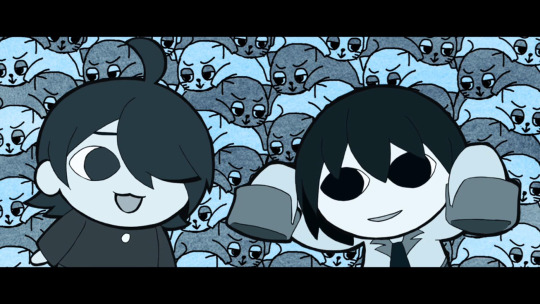
Hi! I was wondering if you could write a meta about Ougi from the Monogatari series.
It’s impossible to talk about one of them without talking about the other, so let’s discuss the unique relationship between Ougi and Araragi underneath the cut, the special relationship between a boy and his shadow.
1. Character Concept: The Jungian Shadow
There’s a lot that can be discerned about Ougi just from the type of character they are. Their relationship with Araragi defines them entirely, without Araragi there is no Ougi.
Ougi’s design is intentionally meant to parallel Araragi’s. Araragi has a very bland light novel protagonist kind of look to him (hence why he never gets any cover art) his only distinguishing feature is that his hair is styled to cover one eye at almost all times. This is because Araragi’s primary character trait is obfuscation looking at things through only one eye you are never going to get the entire picture.
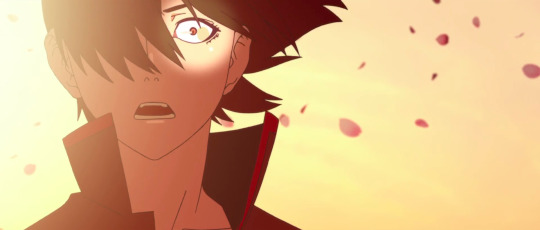
If Araragi’s character design is plain and normal, because that is what the primary protagonist type of these kind of series are an ordinary high school boy, then Ougi’s is the opposite, their design is attention grabbing and unique. If Araragi is normal, Ougi is visibly abnormal, you can already tell there is something subtly off by looking at them. What Araragi hides underneath the surface, Ougi is.
The primary feature of Ougi’s face and the one you notice immediately is their eyes, large, dull eyes, which are the focus of their entire face. Ougi is always shown staring forward with those eyes, unblinking, directly at you. It’s symbolic, eyes are symbols of insight, if Araragi obfuscates then Ougi sees everything. Ougi also wears the Naoetsu high girls uniform. They take the appearance of what Araragi cares about the most, a girl that he can save. Their skin is pale, and their hair dark, which could mean two things, either black and white, light and shadow kind of thinking that Ougi represents or, it’s just supposed to make them look like the kind of ghost that is common in Japanese horror.
Finally, Ougi’s sleeves are so long that their hands are almost never shown. This indicates two things, one human hands are signs of intimacy. What are your hands for? is a pretty famous quote from Evangelion, by never showing their hands Ougi cuts off intimacy because they exist as a symbol of isolation. The next is that Araragi is characterized as someone who always reaches out a helping hand, whereas Ougi is the opposite they stress individual agency and often leave others like Nadeko to their own fate. They may orchestrate things from the shadows, but ultimately Ougi never directly acts, and let’s the characters decide to step off the cliff all by themselves.
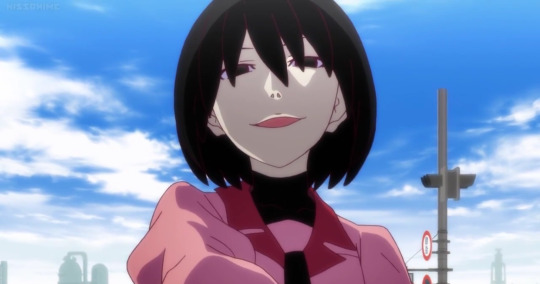
The fact that Araragi a boy, makes Ougi appear as a girl is also a play on binary gender. Ougi is technically genderless, but they appear as a girl initially because themes of binary opposition, and black and white thinking are at play in their character. Araragi is someone who tends to see the world in a binary way. Light and dark, black and white, male and female, they assume there is some kind of proper order to the world that needs to be followed. When Araragi begins to let go of these ideas Ougi is freer to express their gender any way they like.
A binary opposition (also binary system) is a pair of related terms or concepts that are opposite in meaning. Binary opposition is the system of language and/or thought by which two theoretical opposites are strictly defined and set off against one another.
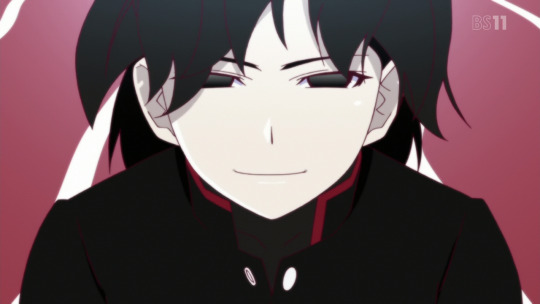
Ougi is based primarily on two ideas. One of them is a pretty obvious reference to the King of Distortion from Boogiepop, which is the series which started what we now call ‘Light Novels’ in Japan by popularizing urban stories with heavy sci-fi or fantasy elements. Araragi even directly references the king of Distortion.
“Tell me, what are you thinking about now...?”
“Don’t suddenly become the king of Distortion.”
Out with the cool quotes, scolded my sister. I deeply reflected on it. (Nekomonogatari White).’
The king of Distortion is a character who’s physical appearance and personality changes with every character they interact with, and who is able to enter the dreams of other people and see the desires in their heart after which point he makes an attempt to correct them.
While the King's personality changes with whatever person's form he is taking, in general, he seems to share a soft-spoken, calm and collected attitude each time, always seeming confident, most likely because of his knowledge of distortions in the hearts of each person's subconcious he enters. He claims his goal to be to 'turn the people's suffering into gold', which involves having people deal with their inner turmoils and coming to terms with them, which is why Boogiepop does not consider the King an enemy of the world, as he doesn't truly do anything particularly villainous.
King of Distortion like Ougi is also born from a single character’s regrets. The King of Distortion was born the moment Shirou Tanaka arrived at the Moon Temple. The main cause for the King's creation was the pent-up regret Shirou felt after entering a relationship with Naoko Kamishiro even though he didn't love her, figuring that he would just develop feelings for her later. After the girl's death, Shirou's self-hatred grew as he realized he wasn't particularly affected by her death in any real way. These feelings were also amplified by the fact that he knew about Akio Kimura, someone who truly loved Naoko, and deserved her way more than himself. These complex feelings of his manifested as the King of Distortion, a being born from Shirou's MPLS evolution.
King of Distortion is an entity born from repressed regrets and self hatred, what a character refuses to acknowledge about themselves or confront. Therefore, both King and Ougi are Jungian shadow archetypes.
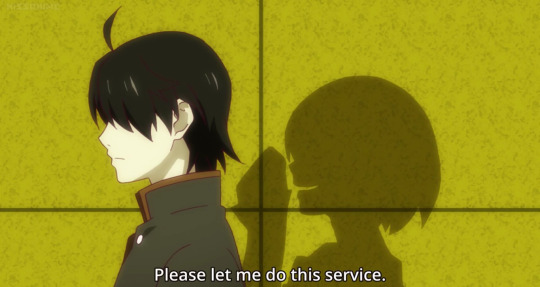
Both as one, one as both.
One is both, both are one.
The Niounomiya siblings with their slaughtering magic.
He and she pass their time in the same body.
Passing their shuttered time.
Passing their shuttered space.
She is Jekyll, and he is Hyde.
One as both, both as one.
Both are one, one is both. Hitokui Magical - [x].
Robert Louis Stevenson wrote the now famous tale, The Strange Case of Dr. Jekyll and Mr. Hyde, a story famous for its astute psychological insight that “Man is not truly one, but truly two.”
In Stevenson’s novel, Dr. Jekyll is a well respected doctor who cares deeply about the admiration of others and strives to be a good human being. In his laboratory he concocts a potion that when ingested transforms him into Mr. Hyde a primitive, unruly and destructive man. Reflecting on the nature of his transformation, he discovers a truth about the nature of a human being.
“I learned to recognize the thorough and primitive duality of man; I saw that, of the two natures that contended in the field of my consciousness, even if I could be rightly said to be the either, it was only because I was radically both.” [Source.]
The shadow exists in a dual relationship with the persona, developing in turn with it. In Jung’s terms the self, is the sum total of the psyche. Both is one, and one is both.
The persona comes from the latin word for “mask”, it’s the elements of personality which arises “for reasons of adaptation or personal convenience.” [Source.] It’s a simple idea, the way you talk around your friends is different from the way you talk in front of your grandmother. People are constantly choosing consciously which parts of their personality to show in front of others, especially in relation to how they would like to be perceived. It is a performance, but that does not mean it is not real. Every part of the identity matters.
It leans heavily on embodying only one’s best qualities, leaivng all those negative traits which contradict the Persona to form the “Shadow.” Jung called the shadow the part of the psyche the unconscoius aspect of the personality. Because one tends to reject or remain ignorant of the least desirable aspeccts of one’s personality, the shadow is largely negative. It consists of everything which exists outside of the light of consciousness, but it can be both positive and negative. “Everyone carries a shadow”, Jung wrote, “And the less it is embodied in a person’s life, the blacker and denser it is.” The shadow is unscious, things which our mind experiences but we cannot control, dreams, desires, instincts.
Without a well developed shadow, a person can easily become shallow and extremely preoccupied with the opinions of others, much like how we see Araragi act in Monogatari. Jung believed that, not wanting to look at their shadows directly, many people project those flaws onto other people.
In terms of literary theory then, the Jungian Shadow archetype is a character who is made up of all the flaws that the protagonist refuses to confront. They challenge the protagonist merely by existing, because the protagonist wants to look away and leave those qualities unacknowledged. Often, they are an antagonist merely because the protagonist projects all of the flaws they cannot see into themselves, onto that other person.
2. Araragi Koyomi - He Obfuscates
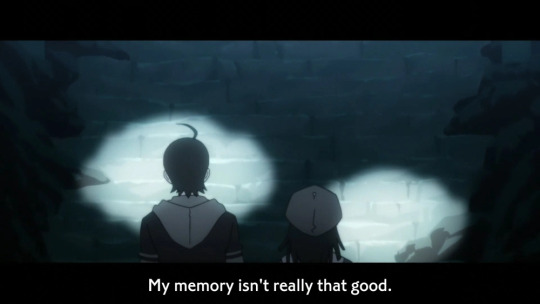
It is impossible to see the shadow without the light. It is impossible to describe Ougi without first talking about Araragi Koyomi. Just like Ougi, let’s start with the origins of his character. While this is just my own personal speculation I’m not NisioIsin, Araragi has always read as written in response to two things to me: First Ii-chan, the protagonist of his first series Zaregoto, and second harem protagonists in general.
II-chan and Araragi are both very flawed and non-confrontational human beings, but whereas Zaregoto is a story about how II-chan really does not want to change himself and instead just kind of wants to stay treading water, wants to never cause any more ripples, wants to hold onto the fragile sense of self he has Araragi’s is a story of a bad and hypocritical, shallow kind of person striving to grow up and become a good person, acquire depth.
The stereotypical harem protagonist is this, a plain guy with no personality who somehow gets girls to fall all over him, often for showing them the bare minimum of kindness. Monogatari is partially a deconstruction of harem series because it shows the kind of circumstances that would cause all these girls to fall all over one guy, literally they are all so deprive of affection that the smallest show of kindness does actually make them fixate on Araragi.
The thing is Araragi does have a clear personality. He is very cynical, he’s judgemental of other people, he really likes to snark. Part of the reason he likes talking to Senjyogahara so much is he can be meaner, and sharper tongued than he normally presents himself as around people. He has traditional black and white views of justice. He tends to meddle. He is observant, but his style of thinking is flawed because he tends to jump to conclusions quickly rather than thinking out the details slowly and methodically. He’s almost constantly anxious, but usually responds to the anxiety with avoidance. However, a lot of his more distinct personality traits sound more negative rather than positive, so Araragi has a version of himself he presents to others who he is less close to. This ‘self’ is much more vague, and wishy-washy, very go with the flow. Despite the fact that Senjyo and Hanekawa both comment that Araragi is well known among the students as a delinquent, Araragi himself says that he’s a typical high school student with a completely normal personality. He defines himself as vague on purpose, that sole purpose being to appear as more acceptable to others, because like an ego that refuses to acknowledge his shadow Araragi is very shallow and defines himself entirely on the opinions of the other people around him.
He is lacking a sense of self, or rather that sense of self eventually escapes from him when his shadow runs away Peter Pan style and becomes Ougi.
Araragi has three primary character flaws that manifest in the form of Ougi, Araragi is a hypocritical altruist who only cares about weak girls that need to be saved, Araragi obfuscates, and Araragi only thinks in black and white.
Araragi is not someone who helps people because it is the right thing to do. He does not do good deeds because they are good. He only helps others because there is something he gains out of it. One thing that’s important about Araragi is that he has a cripplingly low self esteem, to the point of self harm, self flagellation, and even suicide attempts.
He literally says so when he finds Kiss-Shot’s body, his first response is not to call for help but rather to try to let Kiss-Shot kill him, apologizing for living such a worthless life until this point. It’s not just that Kiss-Shot was in trouble, Araragi also made it about his own self loathing.
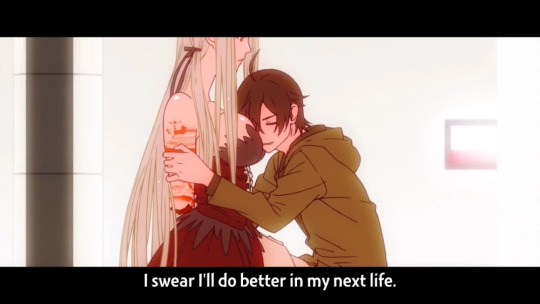
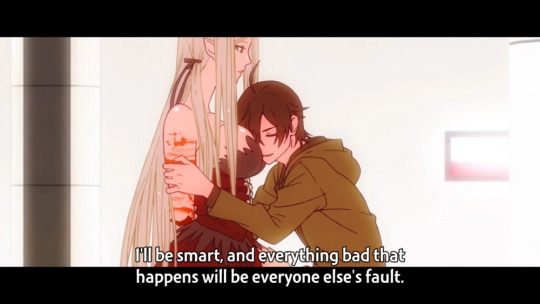
Araragi seems selfless to a fault, but he’s actually very self obsessed. While it’s true that Araragi desires to be a good person, and improve as a person, his methods for self improvement are faulty. He’s obsessed with appearances, and it’s more like he wants the appearance of a good person rather than actually having to put in the work at first. He wants to feel like he’s saved others. He wants to feel like he is someone worth something. He saves others because it increases his self worth, and also once again he gets something out of it. Araragi saving women that are weaker than him makes him feel special, like somebodyy needs him.
He wears the persona of a hero, rather than actually trying to be one. It happens again and again in the series. Despite the fact that Araragi actively does heroic things literally all the time, he also denies any role of being a hero because he does not want the responsibility of being one. Araragi wants the world to be burger king, he wants to have it his way. He wants the best of both worlds, Hannah Montana style. He wants to save girls, but he doesn’t want to be their hero and be entirely responsible for them.
“Araragi-kun, even if you can become a star, you can’t become a hero.”
“I can’t become a star.”
I shook my head.
“I can only become a vampire.”
And I even failed at that.
“I see.”
So you’re not going to be - my hero.
Nekomonogatari: White (Hanekawa and Araragi)
Take his actions in Nekomonogatari. Araragi claims it’s impossible to be a hero, he says that Hanekawa cannot be saved and calls for her to take personal responsibility and face everything that is wrong with her life. However, rather than trying to just support her with that difficult task Araragi immediately jumps to self harm.
It’s impossible for Araragi to become a hero, but he can swallow a katana and then trick Hanekawa into killing him because that is somehow easier than facing his feelings for Hanekawa head on. Araragi prefers bloody, painful self harm to the terrifying ordeal of being known. Araragi knows that Hanekawa is in need of help, but the fact that she is such a messy person different from the person he originally saw her as, makes him afraid of her.
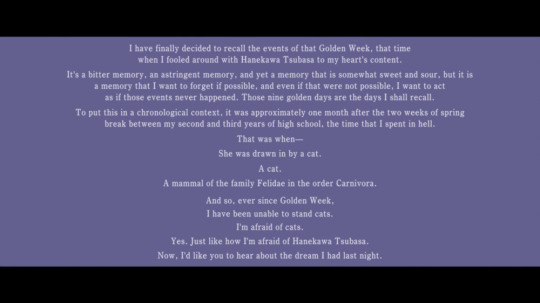
The thing is human beings are really sloppy. They are a messy gray, and Araragi wants to save them, but he really is just a kid out of his depth with a lot of things. He sees the abuse of Hanekawa’s household, and because he’s literally never even encountered an abusive life he gets so terrified that he runs away screaming. He does care about Hanekawa, but she’s far too complicated for him. He does not even want to touch that mess. It’s much easier for him to see Hanekawa as a hero, all black, or all white, then try to attempt something he does not know how to do and could screw up Hanekawa even worse.
Once again while it is not Araragi’s responsibility to fix an abused girl, and it makes sense a normal high school kid does not understand coping with abuse at all, Araragi at the same time wants to help her. Instead of just admitting that he can’t do anything for Hanekawa, he play-acts at being a hero.
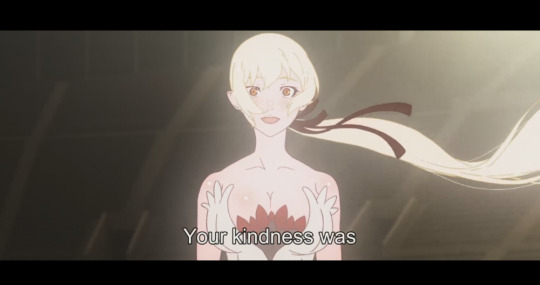
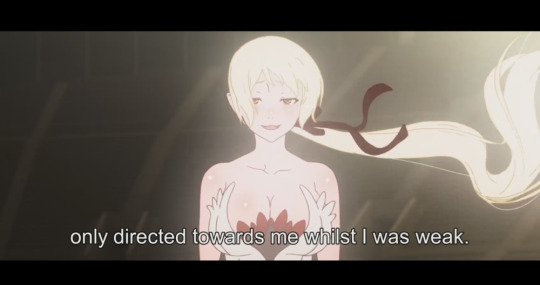
Here’s the thing about Araragi, have you ever once seen him try to save a boy? He only cares about helpless girls because those are the kind of people that heroes save. He does not care about people that are stronger than him, because then he is depending on them rather than the other way around. Araragi only interacts with about three male characters in the story significantly.
Oshino, who is an adult figure that Araragi aspires to be like, and then Kaiki and Seishirou who he both views as rivals for the two most important girls to him Senjyogahara, and Seishirou. Do you notice there is a far different tone in Araragi’s interactions with Seishirou and Kaiki? Araragi absolutely refuses to see Kaiki as anything other than a villain, and while Seishirou is clearly a victim, Araragi cares very little about actually saving him and instead prioritizes competing with him over Kiss-Shot.
Once again this is dude psychology that is present in Harem series. Did you notice if male characters do show up in harem series they are oftentimes, either comic relief, they are terrible people for the main character to look good in comparison, or they are old men mentor types. That is because any other man who would exist in a harem series is automatically competition for the girls. Araragi does not want to compete, he does not want to feel inferior to anyone else, because he always feels inferior all the time therefore he never has any male friends.
Therefore it’s hypocritical altruism, while Araragi is willing to help and that’s a good thing, he also never once helps unless there is something he gains from it. Even if it’s a chance to exercise his self loathing. Once again Araragi’s self loathing is incredibly harmful, he literally gets bones broken, limbs severed, and organs torn out almost every time he helps someone. Not only that but it’s always the first solution he jumps to. This is not the behavior of a healthy person, this is the behavior of someone attempting to punish themselves. Helping these girls by martyring himself is an act of attrition for Araragi, because he believes he deserves pain for all of his hypocrisies, but once again it’s still self obsession. Just hating yourself, just beating yourself up, is different from having to do the actual work of facing yourself and picking yourself up. Araragi will always choose dishonesty over honesty, obfuscation over seeing things clearly.
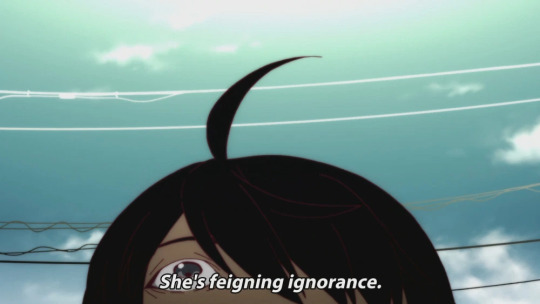
Araragi’s primary strategy of dealing with these many hypocrisies and contradictions in himself, and keeping his ‘ego’ in balance has always been obfuscation. Araragi is observant, but he presents himself as ignorant. He always goes on claiming how stupid he is, and how he’s nothing more than a worthless washout.
This is because Araragi was raised with an overpowering sense of responsibility. While his parents are not necessarily bad parents, they are police officers. He was raised made to feel responsible for things like justice, saving others, and especially made to feel responsible for his own flaws. Police officers are also symbols of justice, who as human beings often fall far short of the law and authority they are supposed to represent, because symbols are symbols and humans are humans.
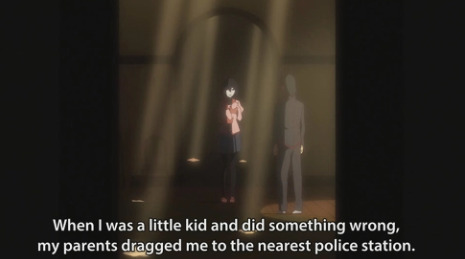
Therefore, what Araragi wants to avoid at all costs is feeling responsible. He wants to be important, but he never wants to take the responsibility of actually being important. This is his immaturity, the part of him that refuses to grow. For Araragi, if situations are too complicated for him to handle, or he fears his meddling will only make things worse and therefore he will be indicated as responsible his response is to just avoid it entirely rather than struggle or try.
This is shown in the case of Sodachi Oikura, once again someone that Araragi knew about and sympathized with but at the same time could not comprehend. Sodachi lived in horribly abusive circumstances, and both times Araragi encountered her he was a child. Araragi at the same time takes far too much responsibility, and far too little. It’s completely understandable that Araragi a middle schooler had no idea what to do to deal with what was obviously an abusive household, most adults are pretty useless when it comes to handling abused children. Yet, at the same time Araragi avoids any responsiblity whatsoever, he just forgets about Oikura claiming he has a bad memory depsite encountering her at three different significant parts of his life. Rather than struggle and fail, it’s better for Araragi to just not know anything at all therefore it can’t be his fault.
When Ougi drags Araragi through Sodachi’s case, Ougi ‘deduces’ everything, but Ougi’s catchphrase is I only know what you know. Ougi cannot have come to a conclusion that Araragi did not already know or was not capable of figuring out on his own, Araragi just did not think of those things because it was too painful to think.
This is also present in his dealing with other characters. There are several characters who have heavy romantic crushes on Araragi while Araragi is already in a relationship, Nadeko, Hanekawa, etc... Rather than ever just going through the awkward interaction of rejecting them it’s much easier to just pretend he never even notices their affections. Therefore we see him hypocritically, have a girlfriend, at yet at the same time constantly hang out with other girls who have a clear attraction to him and romantic feelings for him and never do anything about it.
Nadeko turns into a god because of obfuscation, both on Araragi’s part and on Nadeko’s. Nadeko is called out for what a hypocritical person she is never wanting to face anything directly, but that behavior is only a reflection, a foil to Araragi’s own, hence why Araragi was never able to save her.
Once again, Nadeko clearly has several problems with her personality, and she also blatantly hits on Araragi several times despite one being a middle schooler, and two Araragi having a girlfriend. Rather than just reject her outright, or acknowledge these parts of her personality, Araragi chooses to ignore everything and reduce her to being a cute girl. Nadeko puts on the act, and Araragi perceives. He then ignores all of her feelings, until they repress more and more and then bubble out into a jungian shadow expression that is Snake God Nadeko who just indulges on all of her instincts and desires and gives up conscious thought and her persona completely.
Ougi always mocks Araragi has a helpless fool, because that is what Araragi wants to be, helpless, foolish, and therefore not at fault when there are unintended consequences of his actions.
Finally, Araragi only thinks in black and white. This is also part of his obfuscation, he never wants to acknowledge how complicated people are. When he’s forced to confront the ugly side of people he almost always looks away.
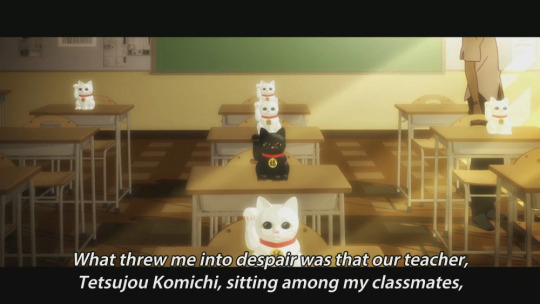
Black cats, white cats, hmmm, I wonder what that means. Araragi was only disappointed with the idea of justice, because he wanted to believe in it in the first place. He wants to believe that things like heroes can exist, and that his black and white perceptions of the wolrd are real. Araragi craves that order more than anyone else, perhaps even more than his younger sisters who just play at being heroes of justice. The reason he becomes so disillusioned is because he expects there to be an order of things, for their to be roles just like in a story, for their to be a sequence of events with meaning.
Araragi expects narrative rules to apply to real life. For life to have meaning. That is why he is a story teller. There are monsters and oddities, and humans with a clear line between them, despite the fact that Araragi himself is someone who blurs these lines by existing as a quasi vampire. Araragi’s life is a story that he tells himself, and that’s why it’s so important that his perceptions are so off. In Tsuki he even gets called on this twice, he calls his increasing vampirism punishment instead of just consequences for his actions and he’s told not to think he’s so special that god would go out of his way to punish him. Tadatsuru asks why they are facing off like this, why Araragi is protagonist and he is antagonist.
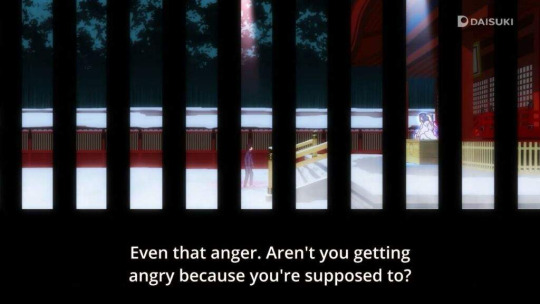
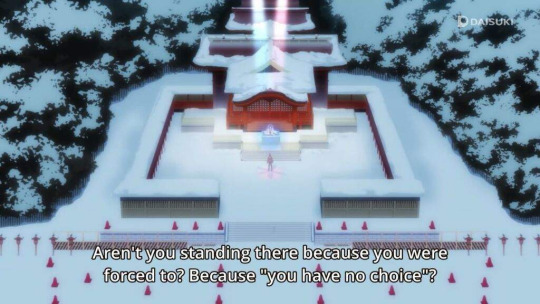
Araragi does not like acknowledging how sloppy the world is, because that makes him feel insignificant and weak. It would make anybody feel that way, because it means acknowledging that we are not as in control of things as we would like to be.
3. Oshino Ougi - They Reveal
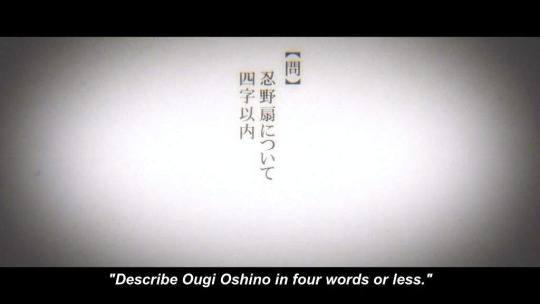
Ougi Oshino is Ougo Oshino.
They are a vague existence, Araragi refuses to define them because defining Ougi means defining themselves and that kind of confrontation is the last thing Araragi wants.
Ougi Oshino is born out of a desire for Araragi to punish himself, the same way he always seeks external punishment by allowing people to beat him up and rip out his intenstines. Rather than confront what is inside of him, Araragi externalizes it and confronts it as an external force which he projects upon.
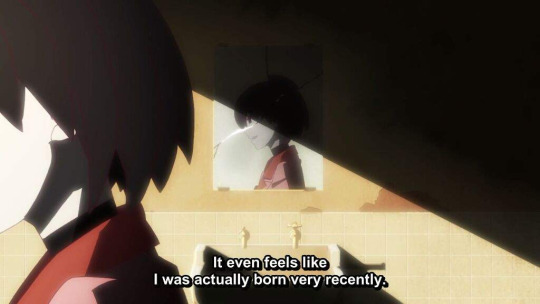
Ougi is a shadow born from the light of Araragi’s ego. It was not the darkness that created them, but rather Araragi himself and the shadow he cast. Therefore while Ougi can be seen as a corrective force, they actually embody all of those flaws that Araragi has, and their own character traits are always in response to those flaws.
Wheraes Araragi is a hypocritical altruist, Ougi is someone who exists to fix people’s mistakes, or punish them for their mistakes rather. Despite manipulating them, Ougi also ultimately leaves them up to their own fate. He leads them up to the cliff but does not push.
Ougi is a hypocritical fixer, because while he seems to be punishing others for their mistakes he really only exists to punish himself in the form of Araragi. All of the ‘mistakes’ he corrects are just Araragi’s own mistakes foiled in other people.
Nadeko is a foil to Araragi, she represents his own feigning of innocent and being unknowing. Kaiki is a foil to Araragi, he represents how much of a fake Araragi is by pretending to cling to ideals of justice and saving others but also denying them as well. Sodachi is also like Araragi, they both prefer to wallow in misery than try to work towards their own happiness. Araragi even says his famous line with his relationship with Shinobu, an ending where everyone is miserable, where nobody gets what they want. There are serious problems with his current relationship with Shinobu, a power imbalance, and both know they cannot last this way forever but rather than attempting to fix their relationship they both cling to the way thing’s are.
Repression and obfuscation is always favored over directly addressing the issues, especially the things which Araragi probably cannot control, or fix, like the complicated nature of abuse. Ougi claims they operate out of some imaginary set of rules that totally exist, but once again Ougi is the hypocrisies of Araragi laid bare. They are every bit the hypocrite that Araragi is.
They are just punishing other people who reflect Araragi’s negative traits. Those who do not acknowledge their shadow, will project their flaws onto other people and see themselves in other people in order to cope.
Ougi is made up of Araragi’s repressed desires. They are a girl he wants to save, which is the only type of person Araragi interacts with. At the same time, they are also connected to Oshino, who is Araragi’s model in the series for adulthood and maturity. Oshino who is always able to figure things out, and very self-collected often making fun of Araragi for his youthful excitement and his naivete for not knowing much about the world.
While Araragi presents himself as an idiot, Ougi is intelligent an capable of figuring things out from scraps of information. Araragi jumps to conclusions, Ougi is deductive and a good thinker. Ougi Oshino already knows Araragi better than himself, therefore Araragi does not have to carry any of the burden of self reflecting, or making himself known to other people around him.
During Ougi and Arraagi’s first meeting in the anime, he hallucinates that the classroom that he is locked inside of floods with water. The depths of the water, the shadow, dreams, these are all the realm of Jung. If the conscious mind is the water’s surface, then the subconscious is its depths.
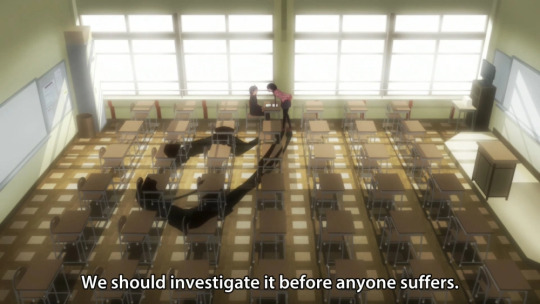
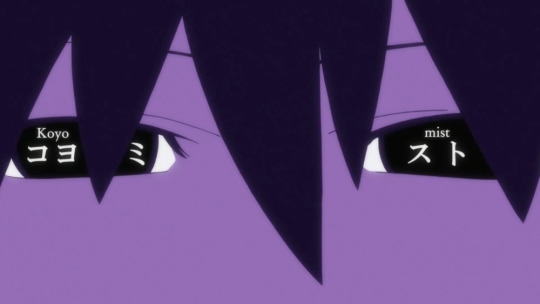
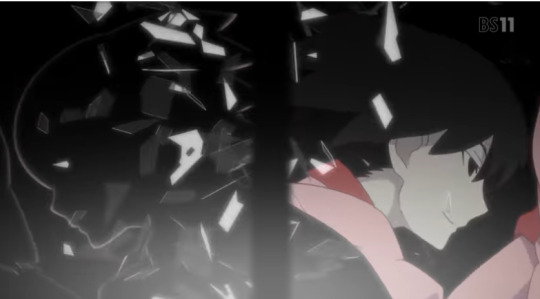
Araragi obfuscates, whereas Ougi reveals the uncomfortable truth. Ougi always positions themselves as a detective. In the realm of stories, it is the detective who makes the big reveal at the end. After all Ougi even says when they are locked in the room together, because there is no famous detective that Ougi themselves will play the role and announce the culprit.
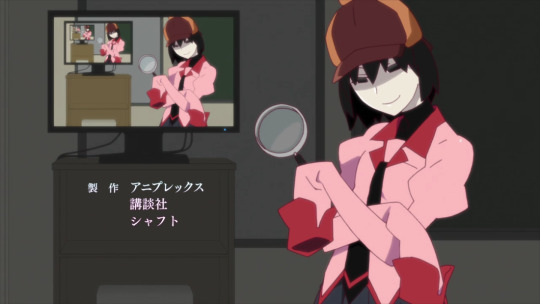
However, Ougi’s reveals are just as hypocritical as Araragi’s obfuscations. Ougi takes the shadow to be representative of the whole self, because they themselves are a living breathing Jungian shadow, but just like Jekyll and Hyde man is both. He is not one or the other, he is both at the same time. Ougi always act with the assumption that there is some kind of truth to be revealed, that this is just like a detective novel where there is a reveal waiting at the end.
Ougi takes the repressed desires to count as the “truth” of the whole mind, and ignores the conscious mind entirely. Therefore, in their view Nadeko is only capable of being a selfish cute girl who sees herself as a victim, Hanekawa is only something scary which Araragi must avoid. They at the same time as Araragi both read the same black and white narrative of the world. They do not care at all for the persona, or how people choose to present themselves. Desipte what Kaiki said to Nadeko that people can choose to be whoever they want to be, and they can try as many times as they like.
Ougi also views themselves as inhuman, and therefore incapable of doing anything, or defining themselves as anything outside of their role. Ougi is in a way, just as repressing of themself as Araragi is. They even lament this in front of Tsukihi, that once the detective reveals the mystery the novel is over. That if anybody would know the truth of them, they would come to hate them because they are abhorrent.
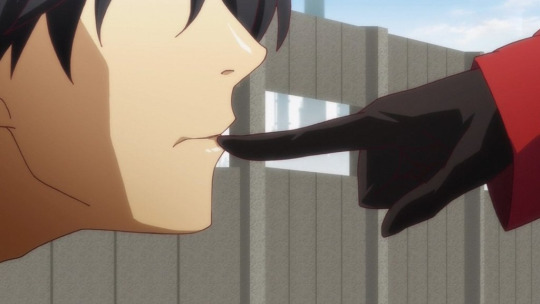
Ougi by repressing concious thought, silences other people and what they have to say about themselves. The only thing that matters is the repressed, what Ougi dictates as the truth must then become the truth. It’s just as much a limited way of saying the world as Araragi’s is. Hence Ougi’s famous catchphrase, I don’t know anything, you’re the one who knows. Ougi sees themselves as a person fundamentally incapable of knowing anything other than outside the bounds of what Araragi already knows.
Which is finally where the black and white thinking comes in. While the two of them seem like polar opposites, their views of the world are actually the same. Ougi wants what Araragi wants, for the world to exist like this is a story. For there to be roles, and order and most importantly meaning. The same way that Araragi just ignores things that fall out of step with their roles, when people contradict the way Araragi sees them he just pretends to be oblivious rather than see them as complex human beings. Ougi actively goes out of their way to punish people, for not playing the role in the story they were supposed to play. He acts like a corrective force, pushing people back into their roles. His wrongful assumption is not that people improve by “correcting mistakes” but rather there was a proper path in the first place. That there was a hero’s journey they were supposed to be going on. There is no path, there is no meaning, it’s all senseless but Ougi exists out of a desire for things to be sensible.
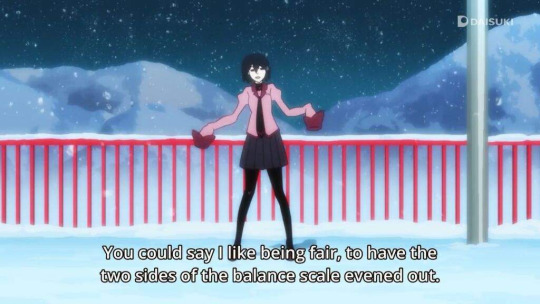

Ougi exists as Araragi’s opposite, because Araragi assumes that things like binary opposites exist in the first place. Heroes and villains, crime and punishment. They both believes these things exist in a fundamental order in the world, and they are not just made up values that humans invented and give meaning to.
“Let’s not joke. Virtue is the antonym of vice, not of crime.” “Are vice and crime different?” “They are, I think. Virtue and vice are concepts invented by human beings, words for a morality which human beings arbitrarily devised.” (No Longer Human, Osamu Dazai)
For both of them clinging to these hypocritical beliefs are better than the alternative, admitting to their own helplessness in the face of a world that is mostly indifferent to them.
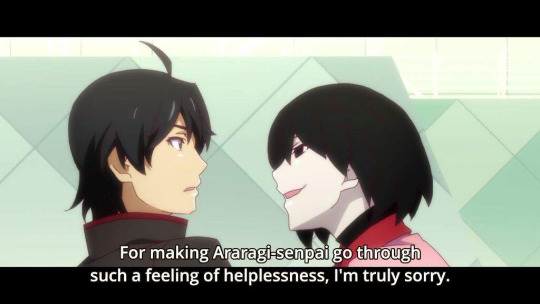
That’s why, when they are separate both of them choose to stick to their ultimately restricting and punishing roles, as protagonist and atagonist, persona and shadow, hero and villain, rather than just trying to acknowledge themselves and live as people.
Both is one, and one is both.
Araragi Koyomi and Oshino Ougi have a relationship that ultimately results in not antagonism, but rather union and acceptance. Just like the King of Distortion is not an enemy of mankind in the enemy, Ougi was never an enemy to Araragi in the first place. Araragi never needed to hate himself or punish himself. The true path forward lies in union and acceptance.
You can never be anything more than yourself, nothing more and nothing left.
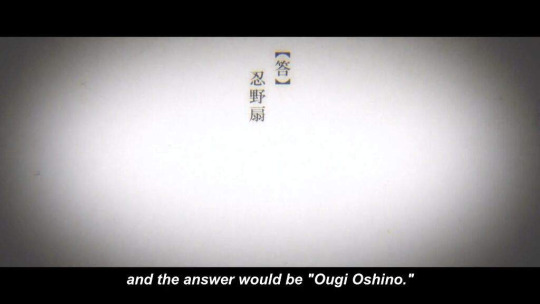
71 notes
·
View notes
Note
An hour of BS from SickSlick: youtu(.)be/FgPwCX2-ObM
Look, I’m not sitting through his shit again. He’s had NUMEROUS chances to convince me of anything. All he’s done is be an asshole towards Miles for doing the same shit RT as always done and yet he likes.
All I care about is the ending, where he ‘quits RWBY because he’s tired.’
Now I have tried doing something similar but you wanna know what the problem here is?
Most of the shit Sickslick is bitching about HE CONTRIBUTED TO.
He complains about how everyone went crazy during Volume 6 while he repeatedly insulted people for liking RWBY and making people either defensive or elitist.
He complains about all the shit being thrown around when he had blocked me because I threw his shit back in his face, lied about me, blocked me which ment I couldn’t defend myself and proceed to call me inhuman despite him doing far worse shit.
He complains about ‘the writers not trying to improve or succeed’ while trying to quote a tweet from a guy who tried treating Miles like a slave IN THE SAME DAMN CHAIN (https://twitter.com/AussieWanderer2/status/984479667615748096)
He bitches about people using Monty as a weapon while even HE HIMSELF ACKNOWLEDGES THAT HE’S DONE IT and tries to say ‘oh but it just makes me MORE tired!’
All the shit he listed out? All shit he’s pedaled. All shit he’s caused. All HIS FAULT. This is the equivalent of watching a politician bitch about corruption THAT HE PARTICIPATED IN.
And if you take a look at his comment section: Oh lookie, anyone willing to kiss his ass he gives open approval for, showing that what he actually cares about is that he can’t get away from his bull. Hell, remember when he said that he’d be willing to attack even himself in this part back when people where giving him screenshots? He never attacks himself once or even ACKNOWLEDGES his bullshit outside the Monty thing which, again, HE TRIES TO FRAME AS HIM BEING A VICTIM.
And he’s STILL doing it in the review. At one point he brings up a commenter talking about how ‘Oh, Salem didn’t use her immortality to attack everyone therefore retard!’ ignoring how Salem openly attacking would ultimately GIVE OZPIN EVERYTHING HE NEEDS TO WIN. The man declared he’d never shoot a gun again then proceed to headshot himself with a grenade launcher.
I don’t feel the least bit sorry for him. He made this bed and now he’s bailing. He can talk all he wants about how ‘RWBY got him out of his depression’: I’ve been through this exact same thing with Gurren Lagann and Evangelion and I think I was shit then. He did the same thing more frequently for longer and never even acknowledged his shit. I’ll feel sorry when he apologizes to Miles and Kerry for using their dead friend as a weapon for his own ego. Until then, hope that multi book series takes off...just so I can see your fans burn you at the stake like you did.
14 notes
·
View notes
Text
My lengthy defense of the most hated Persona game
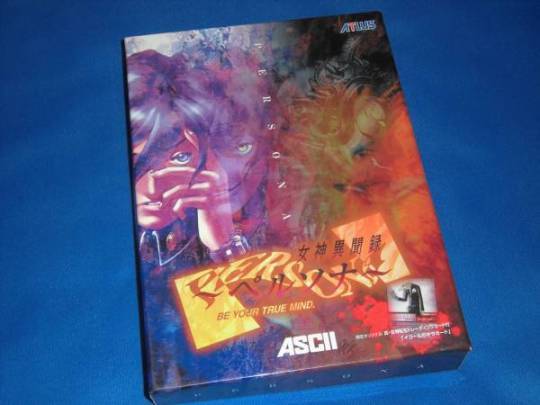
Here’s my grand defense for the most hated game in the series: Persona 1, AKA Revelations: Persona. I know it’s too late to try and rehabilitate the game’s reputation on the internet, but I’m hoping that by rambling in modestly structured form for a bit, at least some folks might be able to look at Persona with a fresh perspective. It would be cool if everyone could try to understand what the game did so well and why it resonated so strongly with me and 2 or so other people. If you are the kind of person that thinks games age and become archaic, then I probably don’t have any hope of reaching you, but still, try to put yourself in the right mindset and approach the game on its own terms, and maybe you’ll discover something quite special.
So, Persona. Persona does very interesting things with choice. As the first Megaten rpg released in America, the negotiation system was a revelation (har har), providing the choice to talk your way out of battles and into rewards is a natural D&D element that never got a foothold in countless videogame conversions of the game, and in the first Persona these elements are at their peak. With every demon having four moods, four series of animation and four sets of voiced sound effects, the expanded options really let you get into the headspace of the demons you’re conversing with, unlike traditional SMT’s more spare binary system. Getting into the thick of things with complex sets of reactions (Joy + Interest, that’s what’s up) makes for a fun simulation.
The theme of choice is also really built into the game’s fabric, it’s the reason why in old usenet postings, Persona was recommended to folks who were fans of Gold Box games, during a time when RPG labels were more porous and that sneaky “J” hadn’t yet latched itself omnipresently to the term. Choice here also extends to the fifth character in your party, a friendly way to promote replay value without new game plus, and certain choices locking you out of giant chunks of the game, an unfriendly way of getting you through the game again. In a world though where developers are desperate to ensure that gamers experience all content (so many buzzwords!), the chutzpah of Persona being willing to lock you out of huge swathes of the game is something I actually admire.
It’s easy to underestimate the impact of the modern day setting in a post Persona 3/TWEWY/Alpha Protocol world, but dungeons that were hospitals and police stations and high school students snarling “EAT THIS” with MIGs in pitched street battles felt revelatory. Exploring the comically low-rent polygonal city (is this another reference to the abstracted icons of SMT1 and 2 world maps?) was actually fun, as ridiculous as waiting for traffic to pass might seem. There are also many complaints about the first person perspective dungeons, even though the rest of the game is third person, but the setting variety is nice and many of the wall patterns are quite evocative (Deva Yuga looks like Persepolis!)
The game also does PSX-era philosophizing in a tasteful and generally thoughtful way, while contemporaries were drawing from Evangelion, Persona looked to Zhuangzi and Jung. Not very high-falutin, true, but at least middle brow enough such that my 14 year old Sophie’s World reading self was entranced. The game has something neat to say about loneliness and identity and the way we construct the world around ourselves (all hinted at in the moody intro. The story is very nice and very Kaneko, even if he’s overestimating the literary quality in this interview, I’m very fond of it and it is my franchise favorite.
Here’s where I alienate the remaining people who might have been on board with me so far: if you ignore the loss of the Snow Queen Quest, a 20 hour alternate version of the story that takes place in a series of SMT:If... like towers, Revelations: Persona is actually the superior game. “Lunarvale,” a hodgepodge of America and Japan cobbled together by localizers attempting to mask the game’s origins, is actually more weird and interesting than the Mikage-cho that appears in Persona PSP. This bizarre mashup, combined with a nonsense translation attempt, somehow manages to better fit the lurid dreamscape vibe the original developers were going for. I can’t undersell how one-of-a-kind and wonderfully unsettling the game’s atmosphere is in the PSX version, and this is helped along of course by the sound.
Here are excerpts from some things I wrote on the music in this game:
Revelations: Persona has the best soundtrack in the franchise, possibly the best soundtrack ever made. In raw quantitative terms it's ridiculous, 113 songs and 3 hours of music without being looped, and all without doing Persona 2's trick of repeated (but still awesome!) remixes. Two majorly sweet leitmotifs for the two major quests, employed creatively and thoughtfully, four fantastic composers on four discs, cohesive and thematically coherent when by all rights it should feel disjointed as fuck, this is a generous OST!
Hidehito Aoki (R.I.P.) composed the dungeon music, which is exquisite. Lengthy songs that are moody, elegant, just plain beautiful and get you PUMPED!
The iconic Deva Yuga
Monochrome: School Revisited Dream-like, synthy, catchy, beautiful, quintessential Persona sound.
Pandora's Den (Deepmost Area): The climax at 1:12!
Ice Castle/Black Snow The twists and turns in this one, so effing good.
Sebek Music, Karma Palace 90's music is the best!!!
Misaki Okibe's range is ridiculous, she composed some of the most memorable, interesting tracks in the whole game.
Reverse Dream World: You think you have this song figured out in the first few seconds, but stick around to see where it suddenly veers off to around :30, hilarious and awesome.
Theme of Nemurin's Love: The intro! The power of a simple lovely melody, a little Uematsu-esque.
Augustia's Wood: The save music, so memorable, I love the grumbling.
City 2 Accident: Do you remember wandering the streets in the town, disoriented, listening to this gorgeousness, thinking about how Lunarvale suddenly seemed so scary, like an unsettling dream?
Bar Attacked by Harem Queen: A bit of jazzy beauty.
And most important of all of course, Misaki Okibe is the composer of the Pharmacy Music, featuring vocals by one Hidehito Aoki of all people.
Satomi Tadashi Drugstore Song In our heads forever, teaching us about item use since 1996.
More alienating for readers who have gotten this far: the “whitewashing” character designs were all improvements, Kazuma Kaneko redrew everything himself and it’s easy to tell that a lot of thought was put into the redesigns. Finally, Mark is also >>>> Masao, everyone’s always yelling about the jive-talking but to me he came across as quite smart and savvy. I dunno, maybe this is just a Flavor of Love/Outsourced minorities just wanna see themselves effect operating here, leave me alone you guys!
So yes, the franchise’s current fanbase might not be fond of them, but the cast is comprised of characters that are meant to be iconic and not friends you wish you had in real life, a cast that, FFVI-like, is meant to evoke broader themes and not follow the typical arcs of many RPGs these days. Check out the classiness of Yuki’s design, and allow me to quote some more stuff on how Tsuchiya, master of the character theme, nails it for each party member.
The sign of a good character theme is when you can extrapolate from instrument choice and melody to personality. Here Tsuchiya is the man, no one does it better this side of Uematsu. I hear these songs and I've got a perfect picture in my mind of each cast member. It's what I think of when I think of "videogame music" ha, here are my personal favorites, I could listen to these endlessly.
Mary/Maki: Cheerful, just a hint of melancholy in the notes, love that slap bass.
Yuki: Starts a bit slow, but soon we learn that Yuki's cool but determined.
Alana: The song tells me she's brassy, energetic, fun.
Chris/Reiji: Dangerous, exciting, a bad-ass delinquent.
Ellen/Elly: Classy, elegant, confident.
Some also rag on the dungeon design, but it seems unfair to expect centerpiece labyrinths along the lines of Strange Journey or Etrian Odyssey in a game going for something completely different. Nevertheless, you’ve got tricky mazes with dead ends that test resource allocation skills and provide a sense of accomplishment. Encounters are tough and require thought, careful consideration of when to flee and negotiate is imperative for dungeon survival. This is something that gets lost a bit in the PSP remake as the encounter rate is increased but battles are a bit easier. Exploiting elemental weaknesses isn’t as elegant as in later games, but with a ludicrously high 14 damage types breadth supersedes depth. And there’s even a positioning system to consider that the developers decided to drop from later games rather than refine. In the end, surviving the dungeon and beating the boss is an RPG staple that just plain works, although yes you will probably grit your teeth at some of the loading times.
And finally, you don’t have to take my random word for it. Parish really liked it too! How’s that for an appeal to authority?
For series buffs, it’s fun to trace this game’s historical lineage, as one of the earlier spinoffs of Shin Megami Tensei, it's easy to spot the mainline series influence: the occultism of the opening ritual, the hospital as first dungeon, the first person perspective for dungeon travel, BLUE POINTER MAN, and the omnipresent danger of demons in town and dungeon alike. Revelations: Persona is drawing from a rich and storied history, but manages to recast SMT traditions in interesting new directions. Again, the atmosphere is really unbelievable and something I haven’t come across in other games. It’s more than a simple curiosity and it doesn’t deserve dumb dismissal or sneering derision for its flaws. Revelations: Persona is a real marvel, modern games ought to draw more inspiration from its lessons, and the game belongs in the RPG canon, there I said it!
4 notes
·
View notes
Link
Here then is my current provisional list, from most to least realistic, where 10 is the real world, and 0 is total cartoon nonsense, with especially emphasis on spaceships and space opera:
10. The real world. Science is explained, no handwavium. Also, Non-Fiction. As TV Tropes puts it: “The Apollo Program, World War II, and Woodstock fall in this class.”
9.6. to 9.9 Technothrillers and Futurology. Technothrillers take place only a few years in the future, with only a few plausible near future tech projections. This category overlaps with Futurology which includes, as explained in TV Tropes “stories which function almost like a prediction of the future, extrapolating from current technology but do not assume or invent any important new technologies or discoveries.” Quite likely some of the more rigorously and scientifically realistic of the ultra hard space exploration categories of the following category actually go here.
8.6.to 9.5 Ultra Hard Science – only extrapolation from known laws of physics. In TV Tropes this is called Speculative Science. In contrast to the previous categories, the science is “genuine speculative science or engineering, and the goal of the author to make as few errors with respect to known fact as possible.” Interplanetary vessels have milligee thrust. Rockets have to choose between high thrust low isp, or high isp low thrust, you can’t have both. Adherence to thermodynamics, real science. No torchships. Preferably no aliens, if there are, they are limited to the same physics we are, and also must justify in terms of Great Silence (Fermi Paradox). Greg Egan, Kim Stanly Robinson Mars Trilogy, Arthur C Clarke 2001, Asimov The Gods Themselves, GURPS Transhuman Space, Andy Weir’s The Martian, the first two books in Robert L. Forward’s Rocheworld series and Robert A. Heinlein’s The Moon Is a Harsh Mistress fall in this class. 9.5 is the most realistic, with only plausible near future tech projections. For some excellent examples on Ultra Hard SF ships in fact and fiction, with authentic rocket science, see Winchell Chung’s Atomic Rockets website, a resource that I simply cannot recommend highly enough. For tabletop spaceship combat game, see Ken Burnside’s Attack Vector: Tactical (although this also has less realistic FTL as a background explanation for why the battles are not in our solar system). John Lumpkin’s Human Reach series features similarily authentic spaceships, although the setting includes wormholes which pertain to one or two realism grades down.
7.6.to 8.5. Very Hard Science – extrapolation from laws of physics, with minimum handwavium for story purposes. Basic torchships (high thrust high isp), interplanetary vessels average around 0.3 gee thrust or less. Adherence as much as possible to thermodynamics and real science. Interstellar, non-relativistic travel. In TV Tropes this is called “One Small Fib”, “stories that include only a single counterfactual device (often FTL Travel), but for which the device is not a major element of the plot.” Some alien or posthuman handwavium / unobtanium allowed. Big Dumb Object without handwavium. Preferably have an explanation for Great Silence (Fermi Paradox). Arthur C Clarke Rama novels, Gregory Benford, Bruce Stirling Schizmatrix, Stephen Baxter. Many Hal Clement novels (e.g. Mission Of Gravity, Close to Critical) and Freefall belong here.
6.6 to 7.5. Hard Science – extrapolition from laws of physics, plus some handwavium for storytelling purposes. In TV Tropes this is called “One Big Lie”. “Authors invent one, or, at most, a very few, counterfactual physical laws and writes a story that explores the implications of these principles.” Tech otherwise consistent and explained. Interplanetary vessels average around 1 gee. Relativistic travel. May have reactionless drive but must be realistic, say exotic matter or singularity or other unusual tech. FTL only if plausibly explained, otherwise relativistic travel. Includes thermodynamics, rocket science, etc. Aliens with realistic-seeming biology, non-humanoid only. Token explanation of Great Silence (Fermi Paradox). Most works in Alan Dean Foster’s Humanx Commonwealth series, the Ad Astra board games and Robert A. Heinlein’s Farnham’s Freehold fall in this category, as do many of Vernor Vinge’s books. Also Haldeman Forever War, Niven Mote in God’s Eye, Greg Bear various stories, Alastair Reynolds Revelation Space/Galactic North Universe, Posthuman Studios Eclipse Phase (everything else very hard, say 9 out of 10, but “sleeving” consciousness with its associated cartesian ghost in the machine implications, also alien wormholes that are pure unexplainedium). John C. Wright’s The Golden Age probably would go here as well (say 6.7)
5.6.to 6.5. Firm Science – with handwavium and unobtanium, but these reasonably explained in the context of the setting. Torchships rather than reactionless drive, but absurd acceleration given energy allowance (fudging the figures). Token thermodynamics only. FTL with reasonably plausible explanation. Ignores Fermi Paradox. Niven’s Known Universe, Peter Hamilton, James Corey’s The Expanse, a lot of space opera in general.
4.6.to 5.5 Physics Plus (to use the TV Tropes moniker). “Stories in this class once again have multiple forms of Applied Phlebotinum, but in contrast to the prior class, the author aims to justify these creations with real and invented natural laws — and these creations and others from the same laws will turn up again and again in new contexts.” Some Science. Reactionless drive ships easily pull dozens or hundreds of gees. Doesn’t explain why relativistic reactionless drive ships aren’t used as doomsday devices to annihilate whole planets, or as perpetual motion free energy devices. Differs from Token Science in that there is still some rocket science. Heinlein Citizen of the Galaxy, Starship Troopers, Brin Uplift universe, Iain M Banks Cultureverse, Schlock Mercenary, David Weber’s Honor Harrington series, David Brin’s Uplift series, and Battlestar Galactica (2003) fall in this class.
3.6.to 4.5 Token Science. Some real science, but only because this is “science fiction”; the science is there only for storytelling purposes rather than realism. For the most part handwavium and unobtanium with little or no explanation. Ignores thermodynamics (no radiator fins). Reactionless drive, agrav, forcefields, tractor beams, stealth, some aliens look like humans, others very different. FTL with arbitrary explanation. Consistency in worldbuilding, in contrast to the Pure Technobabble category. Frank Herbert’s Dune, Dan Simmons Hyperion Cantos, Firefly/Serenity, maybe Eve on line. Babylon 5 may belong here, although humanoid aliens belong to the next category down, and conversely fighters use vector thrust and larger ships generate artificial gravity by centrifugal spin, which put them in at least the 6 or 7 out of 10 category.
2.6 to 3.5. Technobabble and Handwavium. Differs from Science Fiction In Name Only in that at least there is some attempt, no matter how poor, at a rational explanation. Or in otherwords, to quote TV Tropes: “Phlebotinum is dealt with in a fairly consistent fashion despite its lack of correspondence with reality and, in-world, is considered to lie within the realm of scientific inquiry.” So for example the Enterprise cannot land on a planet, showing that large ships are outer space only. Even so, this is still full of sillytech and inconsistent worldbuilding. Because of handwavium and phlebotinum, anything can be explained. You can have ST style matter transportation because it is assumed all the technical problems were solved, most aliens are humanoid, many identical in appearance to H. sapiens, human and aliens can interbreed, and humans live in similar environments can eat same food etc, because it is assumed there were humanoid progenitors. At the same time, there is serious worldbuilding incompatabilities e.g. if you have ST matter teleportation otherwise you could easily drop a nuke in an enemies lap, have immortality, limitless clones, etc. But it is never explained why this never happens. Star Trek is the classic example, but also included here is E. E. “Doc” Smith’s Lensman series, Neon Genesis Evangelion, Warhammer 40k, the Star Wars Expanded Universe novels (now called “legends” and considered non-canon) which at least make some attempt at explanation over the totally unrealistic canonical movies, Cowboy Bebop, and StarCraft.
1.6 to 2.5 Artistic License. Although unambiguously considered to be “Science Fiction”, there is no actual science to be found. Rather, the story follows what looks good artistically from our contemporary early 21st century perspective. Ships wheel and bank in a vacuum, blaster bolts move slower than tracer rounds. Battles directly mapped from WW II naval engagements. Lantern-jawed heroes and busty maidens, or scary monsters, or both. More realistic than comic book superheros only in that it’s assumed you need a spaceship to travel through space, and there is an attempt at a consistent plot. Star Wars, Guardians of the Galaxy, Dr Who, Red Dwarf, Farscape, Space Battleship Yamoto. Some Star Trek movies, e.g. Star Trek out of Darkness has worldbuilding inconsistencies that are if anything even worse, e.g. Transwarp allows teleporting across interstellar distances, but it is never explained why people still use spaceships
0.1. to 1.5 Comic books. Only token attempts at explanations – Marvel and DC superheros, e.g. superpowers because from a planet with a red sun, Genetic mutation, or Peter Parker bitten by a radioactive spider. Sometimes not only that, so that, to quote TV Tropes: “Green Rocks gain New Powers as the Plot Demands”. The DC and Marvel superhero universes belong here, along with Futurama, manga and anime like Dragonball Z and Tengen Toppa Gurren Lagann, and humorous aspects of The Hitchhiker’s Guide to the Galaxy.
0. Cartoons that are not meant to make sense, e.g. Marvin the Martian
21 notes
·
View notes
Text
author ask and tag!
tagged by: I was tagged by @im-immortal for ever ago and am trash who is finally getting to it! God I hate work taking up shit lol
name: Liz / weapon13WhiteFang/w13WFang
fandoms: Honestly anything that can catch me. It was Human Target for a long time/ Now it’s most The Walking Dead…. Death Stranding and Hazbin Hotel have also decided to take over my brain so you might see something for that later.
where you post: FFN and AO3. Ive been doing more on AO3 though.
most popular oneshot: Curiosity And A Little Glass Vial according to FFN. destined to be wedded on AO3
most popular multi-chapter story: But, Oh, Those Summer Nights (The Walking Dead) and Baby, I Want You Back (Guardians of the Galaxy). I think the first one is so popular because Bethyl is pretty popular with a lot of people and it’s based around the movie GREASE with a touch of 1950s vibes. And the second is because - i think - Yondu is a favorite and there’s a lot of us that ship him with Meredith Quill, Peter’s mom... I feel bad I haven’t updated these in awhile...
favorite story you wrote: Dizzy With A Canary - I still love Merle/Beth and I love studying about the 1930s and Gangsters and speakeasies and flapper girls and I just really love this piece. It really needs to be updated, I just haven’t had the right focus for it. I have to be in a very certain mood to update this piece.
story you were nervous to post: I don’t really get nervous about posting fanfiction anymore. It’s fanfiction. I make sure to put in the beginning that “look, this is how this fic is going to be, sorry if you don’t like it but that’s how it is” and I just ignore people that get pissed or don’t like something. I’ve written about drugs, rap(3), assault, horrible killings, etc, etc... I’m not very reserved in my writing. The concept of being so sheltered against shit that is real is just dumb to me... Plus - honestly - working for the local Sheriff’s office has really opened my eyes to just how fucked the real world can be.. I DO HOWEVER try to touch on these carefully. I put warning and I make sure people understand that - yes - what I wrote was disgusting or horrible. Sometimes I’m a little shocked I can go that route. But writing about something/something being said or done to someone... That doesn’t mean it’s me and I know that. The more you see and learn and read, the more fucked up you can see the world. Whats the point of hiding? That’s what I use my fanfiction for sometimes. It’s part of the story to me... If any of that makes sense.
how you choose your titles: I honestly really suck at titles. I’m just not very creative with them. I try to be. But some are just dumb. Or based off of lyrics from a song or a random quote.
do you outline: I started outlining A LOT more these last two years. It doesn’t always help me write but at least I know where I was going to go with my pices. So if I come back way later, I can keep on trucking.
complete: Just a bunch of one-shots
in-progress: Way too many to name honestly. Just go to my FFN or AO3 and take a look around.
coming soon/not yet started: I got about five I don’t mind sharing a little about.
Witch AU/Semi Haunted Mansion crossover that I had intended to post on Halloween but it grew WAY bigger than i intended so I’m keeping it all nice and prepped to work on. I have the first chapter started on this one because, as I said, it started out as a large one shot that has spiraled.
So since I am like obsessed with Death Stranding, I have a Walking Dead/DS idea. I won’t be able to completely work on this because I’m still playing the game and don’t wanna jump guns until I’m sure of stuff dealing with it. But I have a basic idea ready/started the outline and it’s gonna have Beth and Daryl and Carol as big players so this’ll be fun for me to play with.
Cyber-Punk/SciFi/Romance/Thriller idea. I have been watching and rewatching a lot of Cyberpunk Anime and movies and scifi stuff lately. Neon Genesis Evangelion, Akira, Chobits, I Robot, Ex-Machina, RoboCop, Ghost in the Shell, etc etc... I’ve been listening to a lot of cyberpunk/electro music as well. So accumulate all that and it spawned this idea for a walking dead cyberpunk-ish AU idea that I want to really dig around in and explore “What is human” like a lot of people do and have my take on it.’
Rewatching Sons of Anarchy so I wanna play around with a fun/somewhat dramatic SoA/TWD crossover. This ones been really planned out because I wanted to come up with a way to really mix these two together as much as possible
Romeo and Juliet-esq TWD idea that I’m not sure if I want to write or just play around in the world but I have a mini outline for it so we’ll see.
do you accept prompts: Oh very much so, I love prompts! I may not get to it like right away but I love people sending me prompt ideas!
upcoming story you are most excited to write: The Witch AU is probably my favorite at the moment but honestly it jumps around from the five lol
tagging: @tranimation , @chocolatemicenwhiskey, @templeton21 (And honestly whoever wants to do this!
0 notes
Text
No One Is Prepared For Tomorrow's Episode Of Black Clover
The last few episodes of Black Clover have been pretty nuts, huh? We had the Royal Knights storming the base of the Eye of the Midnight Sun, a group that kind of hates the idea of, well, the whole Clover Kingdom. We get to see more action from Julius Novachrono, the Wizard King who's so calm and unflappable that his whole energy could be described with "You've activated my Trap Card, Kaiba." And the dream of every anime fan that is living, has ever lived, and ever will live came true where, for a little bit, we got TWO Astas:
Not only is Asta talented enough to be a part of the Royal Knights but we also get double the Black Clover Best Boy? We are truly blessed.
Oh, and I guess I should mention THAT surprise (STOP READING HERE IF YOU DON'T WANT TO BE SPOILED): William Vangeance (First Captain of the Golden Dawn squad of the Magic Knights) and Patolli (leader of the Eye of the Midnight Sun) pulled a "IT'S ME AUSTIN" and revealed that they are two souls in the same body. And now Patolli, after giving a very abbreviated villainous speech (Kudos, Patolli, for not wasting too much time giving us the standard "Humanity is a disease with no cure" monologue. I get it, villains of the world. The earth is imperfect, the nature of man is pain, We must start anew, etc. Just get to punching Goku), is now attacking Julius. So it's Patolli using his Kizaru-esque light magic against Julius' Time Magic, and things have just started heating up.
And even with all this, y'all aren't prepared for what's coming tomorrow in episode 93.
Look, I know a lot of people tell us every day that we're not prepared for some kind of entertainment that is to come. It's the best way to get people hyped for anything because you don't know quite what it means. I'm not ready? In what regard?
Do I need to stock up on canned goods and prepare my Black Clover fallout shelter? Do I need to practice emergency anime drills to ensure that my family knows what to do in the case of a Class 5 Black Clover disaster? Or do I just need to make sure that my pillow is extra soft for when I cry big, beautiful anime tears into it later? Well, in the case of what's coming next, make sure to do all three. What, you don't have an anime fallout shelter? Where did you go when L died in Death Note? Or when you discovered Rei was a clone in Evangelion? Y'all need to be prepared in times like these, so grab a shovel, dig a bunker, and fill it with Darling in the FranXX posters and Naruto headbands.
Because what's to come isn't going to just change the plotline of Black Clover. In the current arc, the plot gets changed pretty much every episode. Nor is it going to be a simple "this character promised that they would get stronger." No, the entire fabric of the Black Clover universe is about to be altered entirely. Saying anymore would spoil it. And I'm not about that.
So, let's just take a look at the good times in the past and brace ourselves. Put on some kind of wistful music, like "100 Years" by Five for Fighting or something, to set the mood.
youtube
Let's take a stroll through memory lane before Black Clover crushes us entirely.
Awww, remember that? When the biggest concern of Black Clover was whether Sister Lily would smile at Asta or just ignore him entirely? I know that, in those days, Asta spent most of his time doing sit-ups in the woods, but it was a simpler time.
Remember this? It's super relatable. I look like Gollum cosplaying as Ethan Hawke, and puberty hit me like a character customization setting in an RPG, giving all of my points to "Social Awkwardness" and none to "Proper Facial Hair." So "handsome jerk" is how I just describe everyone now.
"I have no regrets or poop left in me" should be a popular refrigerator magnet slogan, selling alongside the ones that say stuff like "I have two rules in life: Wine and I forgot the second rule." In fact, any of these quotes would look good on a fridge.
Anyway, what I'm trying to say is revel in the happy memories of Black Clover's past. Cherish them and hold them close. Tell them to your grandchildren around a warm fire and whisper them to your partner before you go to sleep. Bring them up at parties and when someone asks why you're ruining Allison's birthday with Black Clover trivia again, just tell them that once they watch episode 93, they'll understand. Everything changes on July 23's episode of Black Clover, which you can watch, as always, on Crunchyroll.
Are you excited for what's coming next? What do you think of the current arc so far? Let us know in the comments (and don't spoil anything if you've read the manga!)
-------------------
Daniel Dockery is a writer and editor for Crunchyroll. You can follow him on Twitter!
0 notes
Text
my game of the year list!
i’m not at all qualified to talk educatedly on this subject but i figured i would do my own personal 2018 goty for fun! i have a list below of all the games i remember playing in 2018 and what i thought of them, including games that weren’t actually released this year but that i played for the first time, so don’t get mad when i start talking about supergiant. the second list are my personal top three games from best to not-best-but-still-damn-good, and i’ve gone ahead and removed botw from the running in that because that seems unfair lol. lastly, i have a list of games i want to play next year if i can. so here they are!
games i played this year:
fire emblem echoes: shadows of valentia: i’m big on fire emblem, especially fe13 (lucina was accessory to my bisexual awakening LMAO), and i gotta say this game was a really fresh change from the usual fire emblem formula (i know it’s a reboot but i can’t speak to the mechanics or story of the original since i haven’t played it). sov did a fantastic job making me care about alm and celica (their reunion cutscene ruined me) and honestly? i got used to not having a weapons triangle. i don’t think it’s better or worse than a game like fe13 where you basically get to play rock-paper-scissors if you want to, i just think it’s different. it made me care about different things during battles than just weapons, including dialogue-wise, since you can’t support a character with just anyone. i will say this however: the postgame is FUCKING HARD
fire emblem: the sacred stones: DON’T BE MAD I KNOW THIS IS A GBA GAME i just really wanted to talk about it since it’s so iconic as far as fire emblem goes. the gameplay itself i don’t have much to comment on—it sure is a fire emblem game, rock-paper-scissors and all! the characters though i just have to say are fucking hilarious. ephraim is frat boy gay. anyone watching eirika and seth interact is physically pained by how in love they are and how hard they’re ignoring it. innes is just a wreck, just a huge fucking mess. head over heels for vanessa and what does he do? continues to be the world’s biggest snob. I WANTED TO KILL LYON WITH EPHRAIM TO GET COOL DIALOGUE BUT I SENT LUTE IN TO DO PRELIMINARY DAMAGE AND SHE TOOK HIM OUT IN ONE HIT. INTSYS WHAT THE FUCK
transistor: sword boyfriend.....................................yes
pyre: this game stresses my computer out (i play on a laptop that was decidedly not meant for video games) but that doesn’t stop me from loving it!! pyre is beautiful, the characters are interesting, and the gameplay (despite being essentially just basketball+) is fun once you get ahold of it. my favorite part of the game is the language they created, it’s so lovely and i wish it were real so i could learn it. the main criticism i have is that it doesn’t do a great job blending story and gameplay: the two are completely separate and they take turns being at the forefront of the experience. as my friend once aptly said, “it feels like a first game.”
cave story: ok welcome to sasha’s unpopular opinion corner...cave story was fine? it was fine. sometimes it was a little frustrating, sometimes it was really fun, but overall i just felt kinda “well, ok” about it. i think it might just not be my style of game. that said i do love balrog. what a good friend.
a case of distrust: crime is my favorite type of genre fiction so this was right up my alley story-wise. i also like point-and-clicks because when they’re done well the mechanics blend right into the story, though honestly this one got a little old towards the end and just felt like reading. the ending was also sort of unfulfilling (but the obligatory mystery-novel twist was good). i know this sounds negative but overall i had a great time with this one.
the red strings club: hoooooo boy this game. i had no idea what i was getting myself into. it’s like isaac asimov meets capitalist mind control meets the aesthetic concerns of neon genesis evangelion meets lgbt people. it’s short, compelling, and really fucking creative. who thought of this shit?? and how can i shake their hand????? go buy the red strings club
florence (mobile): i know a lot of people loved it but i thought this game was pretty stupid. the only thing that made it worth the two dollars for me was the music—and i would’ve paid for that without a game to go with it, because i’m a music geek. it was pretty, sure, but i thought the content was trite. it didn’t really make me care, and because of that the “gameplay” felt empty.
the arcana (mobile): does this even count as a game? i’m going to say so for the purposes of this list because you occasionally make decisions lol. anyways the stories here are really clichéd and cater heavily to the player’s emotional/romantic desires but i think that’s exactly what we all came here for so does it matter?? i’m not up to date on nadia’s route because it bored me, julian’s route is alright (a little too clichéd imo although satisfying), but i love asra’s route and i LOVE HIM WITH HIS HAIR PUSHED BACK AT THE MASQUERADE OK
the legend of zelda: breath of the wild: what could i possibly say that hasn’t already been said about botw? i could say this: most underrated part of the game is the diversity and huge sensory gratification of movement/footfall noises and you may quote me on that.
the gardens between: i played this in one day and tbh paid too much for it but it was still fun. the game teaches you really well how the puzzles work and then builds on them, and a couple of the last levels actually require a very careful eye. i think my graphics were a little glitchy (some of the bridges didn’t show up completely and frendt’s sprite ascended as opposed to climbed ladders) but that didn’t affect the gameplay at all, and overall the sets were beautiful. the music is nice and ambient and the ending is quite sweet, though i won’t spoil it of course.
minit (some): i’ve found this game to be fundamentally enjoyable but the time limit stresses me out so i can only play in small bursts and thus have not made very much progress. it is cute though and a little eerie, so there’s a cool atmosphere.
my top three games i played this year (botw):
the red strings club
transistor
the gardens between
games to play in 2019 (rip my bank account):
grim fandango
bastion
return of the obra dinn
moonlighter
the new animal crossing!!
if you actually read all the way to the end of this you’re the coolest, thanks so much!! i’m glad you wanted to hear my opinion, and i hope you played as many fun games in 2018 as i did! happy new year everyone :)
0 notes
Text
A Slice of the Tree of Life
A Slice of the Tree of Life
So I've talked a lot about my view that what Christians should be looking forward to is The Resurrection, not an "After Life". That the perfect Utopia we are promised is not contemporary Heaven but This World restored to something like how it was before the fall.
That to me the true point of the difference between The Gospel and Paganism and is that Pagan myths like those of Gilgamesh, Orpheus or Izanami and Izanagi are about accepting death as a natural part of Life, while The Gospel promises that no Death will be defeated and one day no longer exist. The Second Death is the Death or Death.
Many people who aren't Christians out there however view neither what I just described or the more casual Christian understanding of the "After Life" as desirable. They feel it is grossly naive to think such a condition would be a good thing. In Season 4 of Angel, (the spin off of Buffy The Vampire Slayer), what Jasmine is trying to accomplish was essentially how Joss Whedon views Revelation 21 and 22.
I get the sense that at least some Western viewers of Anime probably have the same view about Human Instrumentality in Neon Genesis Evangelion and End of Evangelion (and the many evil schemes in Anime since that are kind of similar, like most recently *Spoiler Alert* what the Taisha wanted to do in Yuki Yuna Is A Hero season 2). Though there is certainly no Biblical Basis for the rejection of Individuality inherent in that plan. It's far more likely that it's The Beast and the False Prophet trying to achieve something like that with their Mark system.
Back on topic, the argument for why this should be viewed as bad is typically that there is no freedom or growth in a such world, that conflict and difficulty is necessary for that. (So it's funny that sometimes the exact same people make the "why does God allow Evil to exist" argument).
It's pretty difficult for us to even imagine what such a world would be like. But I definitely view that criticism as an over simplification. For one thing there is this Quote from Revelation 22:2
"the tree of life, which bare twelve manner of fruits, and yielded her fruit every month: and the leaves of the tree were for the healing of the nations."
Emphasis on the word Healing. This shows that things are not exactly done. And I personally believe new children will be born during this era as well. A certain thing Jesus said about the Resurrection in Matthew 22 is commonly misunderstood ignoring Jesus actual point. Adam and Eve were supposed to be fruitful and multiply, so if we're restored to that state, it includes that command.
I feel like these criticisms of the world presented in Revelation 21&22 (The Millennium in chapter 20 I don't even view as a true Utopia, but more as a Benevolent Dystopia. Has that term been used before or did I just invent it?), however morally they word it, essentially comes down to them saying they think it would be BORING. Like the common rather tong in cheek presentation of traditional heaven as us just sitting around all day on clouds playing harps while hell is a party.
I don't want to be bored either. I used to spend a lot of time radically declaring Superman Returns the worst movie ever made because to me it is the most boring. I am confident however that the New Heaven and New Earth will not be boring, but I've struggled with finding a good way to explain how. Till today.
Pause and Select is an Anime Analysis YouTube Channel. I just a little while ago, on the night of January 10/11th 2018, watched their four part series on Japanese Apocalypticism in Anime titled Understanding Disaster.
https://www.youtube.com/playlist?list=PL3itZ8UCAizGphd5_cOFylS38JFTV3-Ne
The fourth and final part is what's primarily relevant to what I have to say here. But the first three parts should be watched first for context, it is all interesting stuff. (When talking about Akira, the observation about Akira being the object of worship but Tetsuo being the one really running things happened to remind me of my own re-evaluation of the relation between The Beast and the False Prophet).
In the fourth and final part they make a connection between the development of Apocalypticism in Anime and a certain genre of Anime. They don't use this term in the video, but the genre in question is often most commonly called "Slice of Life". Fortunately much of the narration is subtitled in the video, especially when quoting someone else. So here is a pretty and informative screen-cap.
Compare that to Revelation 21:4.
"And God shall wipe away all tears from their eyes; and there shall be no more death, neither sorrow, nor crying, neither shall there be any more pain: for the former things are passed away."
Another key word used in this portion of the video is "healing", other videos about this genre also associate it with healing and soothing. But to me and many other fans they are absolutely not boring.
One mistake Pause and Select Makes is that K-On! in particularly is not lacking narrative. Digibro's praise of the show is all about it's subtle narrative arch and character development. Meaning there is growth. I'm surprised this video didn't mention Aria. It doesn't mention Girl's Last Tour because it was published over a year ago.
This genre of Anime has been favorite for awhile now, for many reasons. But watching this video just today caused it to click to me how maybe these Anime can also help me how explain the New Heaven and New Earth won't be boring. In theory these Anime exist in the present world and so we don't immediately think of them as being Utopic. But really they are narrative Utopias.
The video goes on to talk about other Apocalyptic Anime that looks cynically on the Slice of Life genre. But because of my Faith in The Bible, I know such a stable future will one day come.
Since I think this post may attract some Anime fans not familiar with what I usually talk about. I want to add a reminder here that I have become a Universalist, and so this coming Utopic Shin-Sekai will be enjoyed by everyone, not just believers. Even Nihilistic Atheists like Digibro.
#Anime#Bible Study#Tree of Life#Slice of Life#Moe#Yuritopia#Digibro#Pause and Select#Yuki Yuna Is A Hero#YuYuYu#Shinsekai#Utopia#Eschatology#Bible Prophecy#new heaven and new earth#Japan#Lucky Star#K-On!#K On#Aria#Girl's Last Tour#Cute Girls Doing Cute Things#New Jerusalem#iyashikei#Human Instrumentality#Joss Whedon#Evangelion#Jasmine#Angel#Paradise
0 notes
Text
@ beautiful-chrysanth
replied to your post“I’ll dedicate the rest of my life to defending the last two episodes...”
Block beautiful-chrysanth
I would ignore it, but as someone who cares a lot, I am curious as to what your defense is of those two episodes and why you would maybe say they are better than End of Evangelion is as Episodes 25 and 26, if you would say that.
I'd like to think that EOE is a better ending to the overall story,while NGE 25+26 is a better ending to Shinji's character subplot.
What really sold me on the last two episodes is probably this scene.
in which there's a space of nothing, and you can only see an outline of Shinji (I think it’s the show’s version of the live action portion+ the inside of LCL in EOE).They both have the same idea ( that the people you interact with shape your identity) ,but I loved NGE’s version more because of how well I felt it illustrated identity loss and emptiness.
You could argue that it looks like this because of NGE’s production issues,I think it was done on purpose,if only because of this quote from a series director:
“I didn't mind it. The schedule was an utter disaster and the number of cels plummeted, so there were some places where unfortunately the quality suffered. However, the tension of the staff as we all became more desperate and frenzied certainly showed up in the film … About the time that the production system was completely falling apart, there were some opinions to the effect that, "If we can't do satisfactory work, then what's the point of continuing?" However, I didn't feel that way. My opinion was, "Why don't we show them the entire process including our breakdown." (x)
And production problems or not,this is a case where it was worked around brilliantly.
Are they better than EOE as an ending? Probably not,they’re a bit too ambiguous at parts and I could argue that the only reason I like them so much is because I watched them first while knowing that there’s more after them.And perhaps comparing them to EOE is a bit unfair as EOE is a much bigger story,but what they do right really resonates with me and most importantly: I really don’t think they’re bad at all.
0 notes